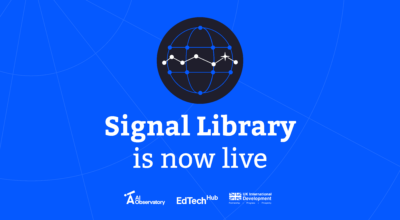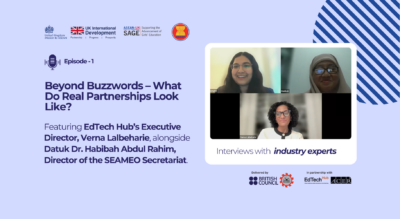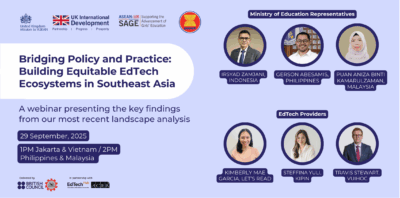
In July 2025, EdTech Hub had the privilege of attending the biennial Distance Education and Teacher Training in Africa (DETA) Conference in Mauritius — a vibrant, week-long gathering focused on ‘Education for Empowering the Global South: Technologies and Pedagogies for Distance Teacher Education’. For two decades, DETA has provided a vital platform for faculties of education across Africa to exchange knowledge and strengthen teacher education. DETA’s primary goals are to contribute to the discourse on teacher education across the continent and to strengthen capacity for delivering teacher training programmes in Africa. This year’s conference — hosted by the Mauritius Institute of Education — offered inspiring keynotes, hands-on workshops, and bold conversations about the future of teacher learning.
Here are six takeaways we left with:
1. Leadership matters in transforming education systems
Why it matters: Support and clear direction from leadership sets the tone for transformation and creates the enabling conditions for teachers and students to thrive.
A standout moment came during a surprise keynote by the President of Mauritius. His Excellency Mr Dharambeer Gokhool opened the DETA conference and, with a background as former Minister for Education, his remarks were grounded in evidence and experience, and deeply aligned with the conference’s focus. Drawing on the theme of the conference and advancements in AI, he urged participants to “harness technologies and pedagogical innovations for the inclusive advancement of education across Africa” as we “chart a new course for education.” His keynote reminded us that leaders who understand education in depth can guide reforms that are evidence-based and equitable.
Linking evidence: Leadership is key to scaling and sustaining teacher professional development. Our Teacher professional development research in Tanzania shares such findings on how strong national leadership enables system-level buy-in and enables effective implementation.
2. Implementation research bridges policy and practice
Why it matters: Too often, research sits on shelves without shaping real-world decisions. DBIR offers a way to change that.
In our first presentation, we shared lessons from our work on technology-supported teacher professional development (TPD) in Tanzania, using a design-based implementation research (DBIR) approach. The first part of our presentation focused on how our research findings — such as those on barriers to teacher motivation, issues about access to the learning management system, and the need for more coordination between different government bodies translated into impact on both policy and practice in Tanzania. The second half of the presentation shared our lessons learnt from using the DBIR process, which involved government implementers as research team members. These critical learnings on supporting effective multiple-level stakeholder engagement, enhancing collaboration and team dynamics through leveraging complementary strengths within the multi-faceted DBIR team, and designing iteratively and adaptively, are captured in a forthcoming journal article (in review) on ‘Design-based Implementation Research for Digitally-Enabled Education Reform: Teacher professional development in Tanzania’. The insights and methodological approach resonated strongly with the academic crowd, who often experience difficulties with the uptake of research findings by policymakers.
Sharing insights: The presentation sparked valuable discussions on the intricacies and complexities of managing and harnessing the full potential of multi-faceted team structures. Conversations highlighted the crucial importance of iterative, mixed-methods approaches for rigorous research. This was debated alongside challenges of limited research budgets and the prerequisite conditions necessary to conduct cost-effective long-term quantitative research. Participants left with practical insights on navigating the intricacies of translating research into policy and practice more effectively.
3. Looking ahead: AI and the future of assessment
Why it matters: Decisions made now will shape how AI transforms learning and evaluation for decades.
Our second presentation on ‘Envisioning Assessment and Evaluation with AI in 2035: Potential benefits and drawbacks’ shared insights from EdTech Hub’s FCDO-funded AI Observatory work and IDRC-funded EmpowerEd strategic foresight research on AI. Some potential benefits that were discussed included:
- Developing offline Small Language Models (SLMs) in rural and remote areas.
- Creating dynamic AI-generated simulations for interactive learning.
- Using GPTs for discursive viva-style assessment.
Potential drawbacks that resonated with the audience included:
- Surveillance that curtails ‘out of the box’, critical thinking by students.
- Cognitive offloading by students alongside reduced professional discernment by teachers with increasing reliance on AI.
- Concerns about using learners as test subjects to experiment with products and platforms that have not been evaluated for safety, accuracy, or effectiveness.
We asked the audience some provocative questions:
- What is the reason students don’t want to truly learn, and how can we intrinsically motivate them?
- Can learning spaces still feel safe and support pluralistic and critical thinking if everything a learner says or writes is processed by an algorithm, building both a visible and hidden profile?
- What if we just did away with grading altogether?
Pondering provocative questions: The questions we asked led to vibrant discussion with the audience during the session, and highlighted the need to research the long-term, holistic impacts of AI on learners, as opposed to research on the current efficacy of AI. Through our AI Observatory, we’ll be continuing to track these future-focused questions, generating evidence on both opportunities and risks, and supporting policymakers and practitioners to prepare for the education systems of tomorrow.
4. Practical ways teacher educators are using AI today
Why it matters: While foresight is important, teachers are already testing AI in classrooms and lecture halls.
A hands-on workshop led by Jody Joubert introduced ways of integrating AI in distance teacher learning. We explored how tools like ChatGPT can be utilised to support teacher learning through better prompting (e.g., AI as a thought partner or critical friend), offering tangible, educator-friendly applications of generative AI. One particularly insightful area of the workshop was how educators can train GPTs as long-form marking assistants by providing the GPT with marking schemes and rubrics. Additionally, GPTs can also be used to create essays of varied levels of quality to be used as training data for the marking assistant. We discussed the successes and pitfalls of this approach, in particular the time and higher-order skill sets required for training the GPTs, drawing on experiences from the University of Pretoria’s staff’s experimentation with long-form GPT marking assistants.
Future directions: The hands-on experience prompted us to pay attention to usability and equity. We’ll be exploring this, and more in upcoming research from our AI Observatory, focusing on how AI is upgrading, disrupting, and transforming the role of teachers in low- and middle-income countries.
5. Recentering playful learning in the age of AI
Why it matters: Arts-based and playful approaches support critical, creative and original thinking in ways that are difficult to achieve through AI.
Dr Marguerite van der Merwe’s session on arts-based and playful learning approaches offered a compelling counterbalance to the broad AI and technology focus of the conference. She illustrated that various forms of play (e.g., social, sensory, physical, mastery, cognitive, creative, and free play) can support diverse ways of enriching learning experiences. Her work emphasised re-centring embodied human connections, creativity, and curiosity in adult (teacher) learning. It underscored the importance of integrating AI with approaches that nurture holistic, human-centred learning experiences.
Re-charting the trajectory: At a time when the trajectory of teacher education risks being overly shaped by AI, playful and arts-based approaches offer a way to re-chart the course. Advocating for learning paths where diverse pedagogies support the learning process, not just assess outputs, is critical for developing learners with divergent thinking, embodied reflection, empathy, resilience, and metacognition.
6. Sustaining teacher learning: Lessons from 20 years of TESSA
Why it matters: Long-term impact in education takes time, clarity of vision, and persistence.
This year marked the 20th anniversary of TESSA (Teacher Education in Sub-Saharan Africa) — a network that has reached over two million teachers across 15 countries. Launched initially at DETA 2005, the celebration was a moment to reflect on TESSA’s remarkable contribution to teacher development and its sustained influence across the continent. What was notable from this event was the pioneering work of TESSA and its original messages that remain so relevant and necessary 20 years on. In its early years, TESSA promoted the need for teacher learning to focus on practice and ongoing, reflective inquiry. It has also consistently focused on teachers’ needs, skills, and experiences, especially in relation to their technological, pedagogical, and content knowledge when considering distance teacher education. These are all messages we talk about at EdTech Hub when sharing what effective tech-supported teacher professional development looks like, and we find ourselves grateful to established initiatives such as TESSA for paving the way for evidence-driven TPD approaches to manifest in low- and middle-income countries.
Building for sustainability: With the vast range of teacher initiatives emerging and fading, the long-term success story of TESSA teaches us that nurturing and sustaining initiatives for impact takes time, a clear focus, and dedicated individuals to keep driving it forward.
Carrying insights forward
DETA 2025 underscored that the future of teacher education in Africa must be locally led, evidence-informed, and forward-looking. From implementation research to AI foresight to sustaining long-term networks like TESSA, the conference showcased how diverse strategies can converge to strengthen teacher learning.
For us at EdTech Hub, the key takeaway is this: evidence must translate into action. As participants repeatedly reminded us, the value of research does not lie in publication alone, but also in how it informs systems, empowers teachers, and improves outcomes for learners.
We look forward to continuing the conversations sparked at DETA, supporting governments and partners to test, adapt, and scale what works — and to ensure that technology always serves teachers and learners first.





